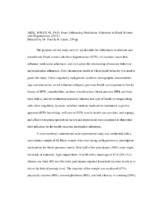Issues influencing medication adherence in Black women with hypertension
View File(s)
Visitor Statistics
Visits vs Downloads
Visitors - World Map
Top Visiting Countries
| Country | Visits |
|---|
Top Visiting Cities
| City | Visits |
|---|
Visits (last 6 months)
Downloads (last 6 months)
Popular Works for Abel, Willie M. by View
| Title | Page Views |
|---|
Popular Works for Abel, Willie M. by Download
| Title | Downloads |
|---|
View Citations
Citations
The purposes of this study were to: (a) describe the differences in adherent and nonadherent Black women who have hypertension (HTN), (b) examine issues that influence medication adherence, and (c) explore the relationship of reactant behaviors and medication adherence. Cox's interaction model of client health behavior was used to guide this study. Client singularity background variables: demographic characteristics (age and education), social influence (religion), previous health care experience (family history of HTN, comorbidities, number of medications, blood pressure [BP], and body mass index), and environmental resources (income and type of health coverage) along with client singularity dynamic variables: intrinsic motivation (reactance), cognitive appraisal (HTN knowledge, self-care of HTN, trust in health care provider, and coping), and affective response (perceived racism and depression) were examined to determine their influence on the health outcome, medication adherence. A cross-sectional, correlational non-experimental study was conducted with a convenience sample of 80 Black women who were taking antihypertensive prescription medications for blood pressure control. Over half of the participants (56%) were single, divorced, or widowed. Ages ranged from 19 to 60 with a mean age of 47.8 (SD ± 9.2). Almost one-third 30% (n=24) of the participants reported household incomes levels at or below the federal poverty level. The majority of the sample was employed (67%), physically inactive (90%), overweight/obese (88%), and had a history of smoking (54%). The study results did not show a difference between those who adhere to antihypertensive medications and those who do not. Also, there was no relationship between reactant behaviors and medication adherence. However, in the optimal predictive model, those aged 40-49 were less likely to be adherent to their antihypertensive medications. In contrast, those who took 5 to 7 medications were more likely to be adherent. Trust in the health care provider was highly associated with adherence to the medication treatment regimen. These results are congruent with the expectation that trust in the health care provider promotes better medication adherence. Future research should continue to identify factors that influence adherence to the treatment regimen among Black women with HTN and develop interventions that facilitate their ability to better manage their HTN and thus, maintain BP control.
This dissertation has also been disseminated through the ProQuest Dissertations and Theses database. Dissertation/thesis number: 3490545; ProQuest document ID: 917235926. The author still retains copyright.
This item has not gone through this repository's peer-review process, but has been accepted by the indicated university or college in partial fulfillment of the requirements for the specified degree.
| Type | Dissertation |
| Acquisition | Proxy-submission |
| Review Type | None: Degree-based Submission |
| Format | Text-based Document |
| Evidence Level | Cross-Sectional |
| Research Approach | Quantitative Research |
| Keywords | Medical Trust; Hypertension in Women; Black Women |
| CINAHL Subject(s) | Blacks; Hypertension; Medication Compliance; Women |
| Grantor | The University of North Carolina at Greensboro |
| Advisor | Crane, Patricia B. |
| Level | PhD |
| Year | 2011 |
All rights reserved by the author(s) and/or publisher(s) listed in this item record unless relinquished in whole or part by a rights notation or a Creative Commons License present in this item record.
All permission requests should be directed accordingly and not to the Sigma Repository.
All submitting authors or publishers have affirmed that when using material in their work where they do not own copyright, they have obtained permission of the copyright holder prior to submission and the rights holder has been acknowledged as necessary.
Related items
Showing items related by title, author, creator and subjects.
-
Taking control with safer sex: Perceptions of African American women
Cornelius, Judith Bacchus; Abel, Willie M.; Drew-Branch, VanessaBy attending this session, the participant will gain an understanding of the concept of "controlled safer sex" based on the perceptions of African American women. Findings from this study will be used to develop an app ... -
Critical factors that influence adherence to therapeutic medical regimen among hypertensive United States Virgin Islanders
Morton, Jamelah A. (2016-07-13)Session presented on Thursday, July 21, 2016 and Friday, July 22, 2016: Purpose: The purpose of this grounded theory study is to explore the various factors that may influence hypertensive therapeutic adherence practices ... -
Critical factors that influence adherence to therapeutic medical regimen among hypertensive US Virgin Islanders
Morton, Jamelah A. (2017-09-29)The findings from this study articulates some of the various factors that influence hypertensive therapeutic adherence practices among persons from the United States Virgin Islands, but also lends to the understanding of ... -
HIV-infected women and intimate partner violence: CD4 counts, opportunistic infections, viral replication, and adherence to antiretroviral medication
Nava, Ma de los Angeles; McFarlane, Judith M.; Trimble, Debra (2012-01-04)Introduction: The purpose of this study was to document the impact on HIV dissease progression, measured as CD4 counts, number of opportunistic infections, viral replication, and adherence to antiretroviral medication for ... -
Development and evaluation of a nurse practitioner-directed medication adherence program for adults with hypertension in an academic medical center
Thorne, Adrienne E.Hypertension affects one in three American adults and is the leading modifiable risk factor of atherosclerotic cardiovascular disease deaths (Arnett et al., 2019). Medication adherence to antihypertensive medications plays ...





